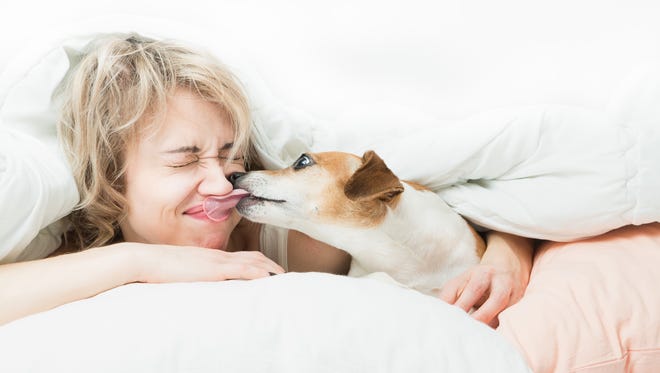Exactly how gross are dog kisses?

Dogs lick us because they love us, but should we love their kisses?
There are more than 700 different types of bacteria in a dog's mouth — and that's just normal bacteria (it doesn't count the rotting ham sandwich Fido found on his morning walk). So, that saying about a dog's mouth being clean is rubbish.
Veterinarians Will Draper and Francoise Tyler, Web MD contributors from The Village Vets practices in Atlanta, Ga., say there are two reasons to be concerned: One, if a dog licks someone who has a weak immune system (like those with cancer) or two, if the dog has a medical condition that could spread.
"If a pet has medical issues such as periodontal disease or intestinal parasites, there is a risk for cross-infection (also known as “zoonotic”)," Tyler said in an email. "These issues should be addressed by your veterinarian if you want your pet to love on you.”
A small 2011 study published in PubMed of 66 dogs and 81 people in Japan suggested dogs kissing their owner's mouths might swap disease-causing oral bacteria.
There's also a more obvious reason you might not want a smooch from your pooch, and that is: They put a lot of nasty stuff in their mouth.
"If your pooch is a scavenger, then a canine lick on the lips could jeopardize your health,” Mehmet Oz told PEOPLEPets.com in a 2011 interview. “The half-eaten hot dog your dog found on the street — or the feces he was nibbling on — could be loaded with germs and bacteria such as toxocara, salmonella, giardia, hookworm, tapeworm and many others, putting your family’s health at risk.”
Before you quarantine your pup, know that there has been some data showing dog germs can have a positive effect. For example, a 2012 study published in Pediatrics showed having a dog at home during an infant's first year of life prevents respiratory illnesses. Dog exposure might even prevent a type of eczema. Some have suggested dog germs are so helpful to a human's immune system, there could be a market for pills of pup bacteria.
But, on the whole, there isn't enough data to show whether or not specifically dog saliva is healthy for humans or not, said Kimberly Kelly, a postdoctoral research associate at the University of Wisconsin-Madison.
Kelly studied possible health benefits from dogs and those ages 50-80 in 2015 by looking at microbe transfers, hoping to show how dogs might improve health. While adults studied did show improved immune function and emotional wellbeing, microbe transfer wasn't particular strong, she said. Did dog kisses help? It's unknown.
Through her research, which is not yet published, she's heard many personal stories from people on both sides of the spectrum, she said, including one who claimed their dog’s kisses healed them from skin cancer and another who believes dog saliva caused a loved one’s death.
“People need to be cautious,” she said. “We just don’t know enough at this point.”
Follow Ashley May on Twitter: @AshleyMayTweets